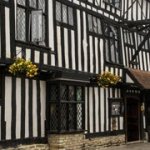CABK Stratford Conference

Falcon Hotel
I’m delighted to be speaking at the CABK Stratford Conference (the Central Association of Beekeepers; Bringing Science to the Beekeeper) on Saturday and Sunday 22/23 November 2014. I’ll be discussing the identification of a virulent strain of deformed wing virus, characteristics of its transmission and potential ways it might be controlled in the future. The CABK website doesn’t yet appear to list other speakers, but the provisional programme I’ve seen lists Alison Haughton from Rothamsted, Ben Jones from FERA, Jochen Plugfelder from Bern and Bob Smith from Kent.
There should be ample time for discussions so please introduce yourself if you want to chat.
Update
Despite the best efforts of the Falcon Hotel (who appeared to have reserved far too few rooms for the registered delegates) the meeting was very enjoyable. The talks I heard were excellent, with ample time for discussion. In particular I enjoyed listening to Bob Smith who showed us the differences between DN5 frames from two of the major manufacturers … one made to British Standard sizes with the wrong beespace (Thorne’s), and the other with the correct beespace between the top bars, the rebated side bars and the wide bottom bars (National Bee Supplies if I remember correctly). Bob’s talk was the only beekeeping talk I’ve heard with psychedelic imagery and a guitar riff. Bob also demonstrated his enviable woodworking skills with an elegant little (mating nuc sized) observation hive. Jochen Plugfelder gave two fascinating presentations on improved formulations of formic acid for Varroa treatment and the chemistry of queen fighting, the latter supported by excellent video. Ben Jones discussed his studies on dietary influences on foragers and – in a commendably dedicated way – rushed off early to complete a time course experiment. Finally (although it was actually the first talk of the meeting in place of Alison Haughton) Robert Pickard presented a wide ranging overview of social and solitary bees and their mimics. The talk was actually so wide ranging that it was difficult to categorise it and was illustrated with a range of interesting slides.
Join the discussion ...